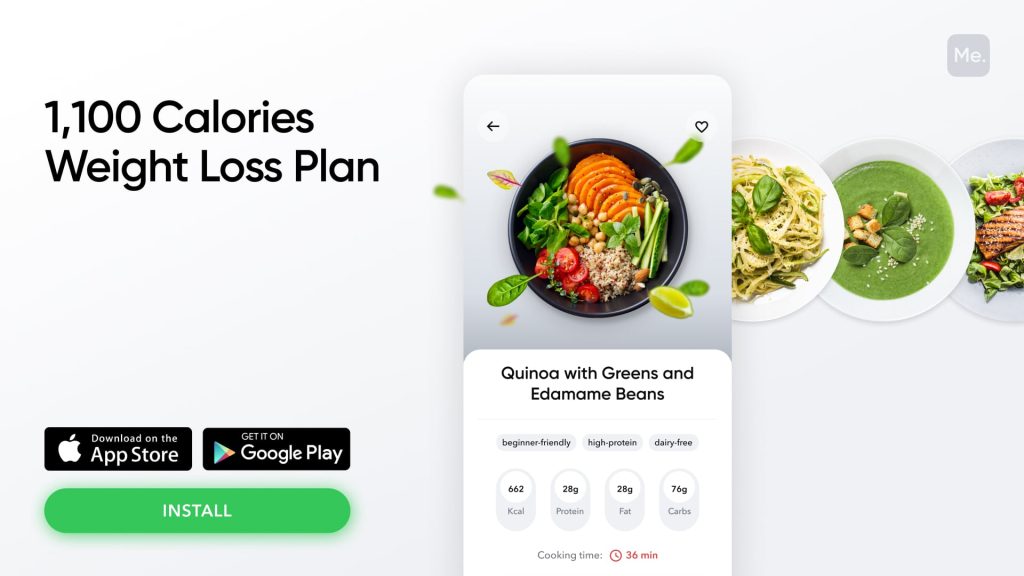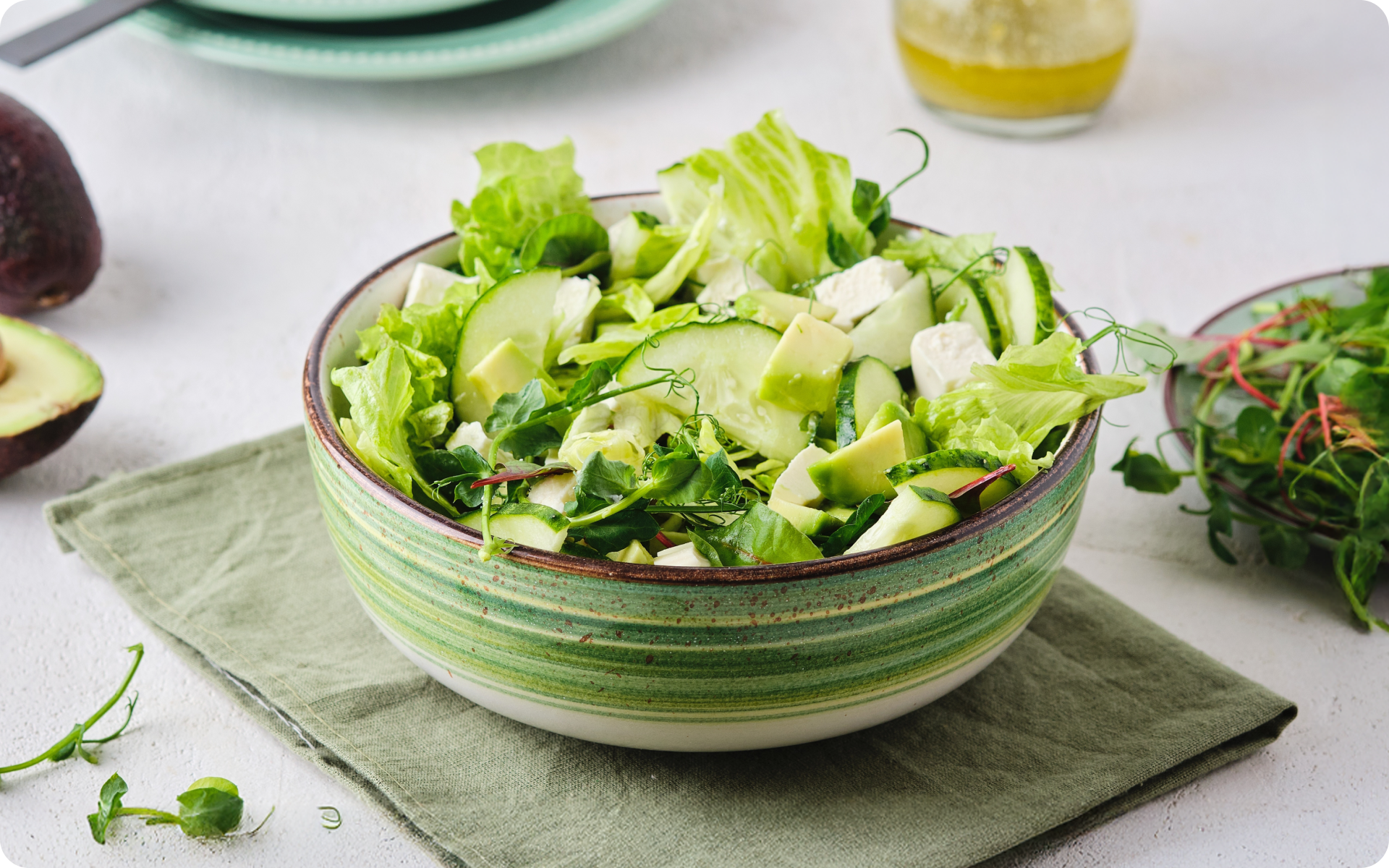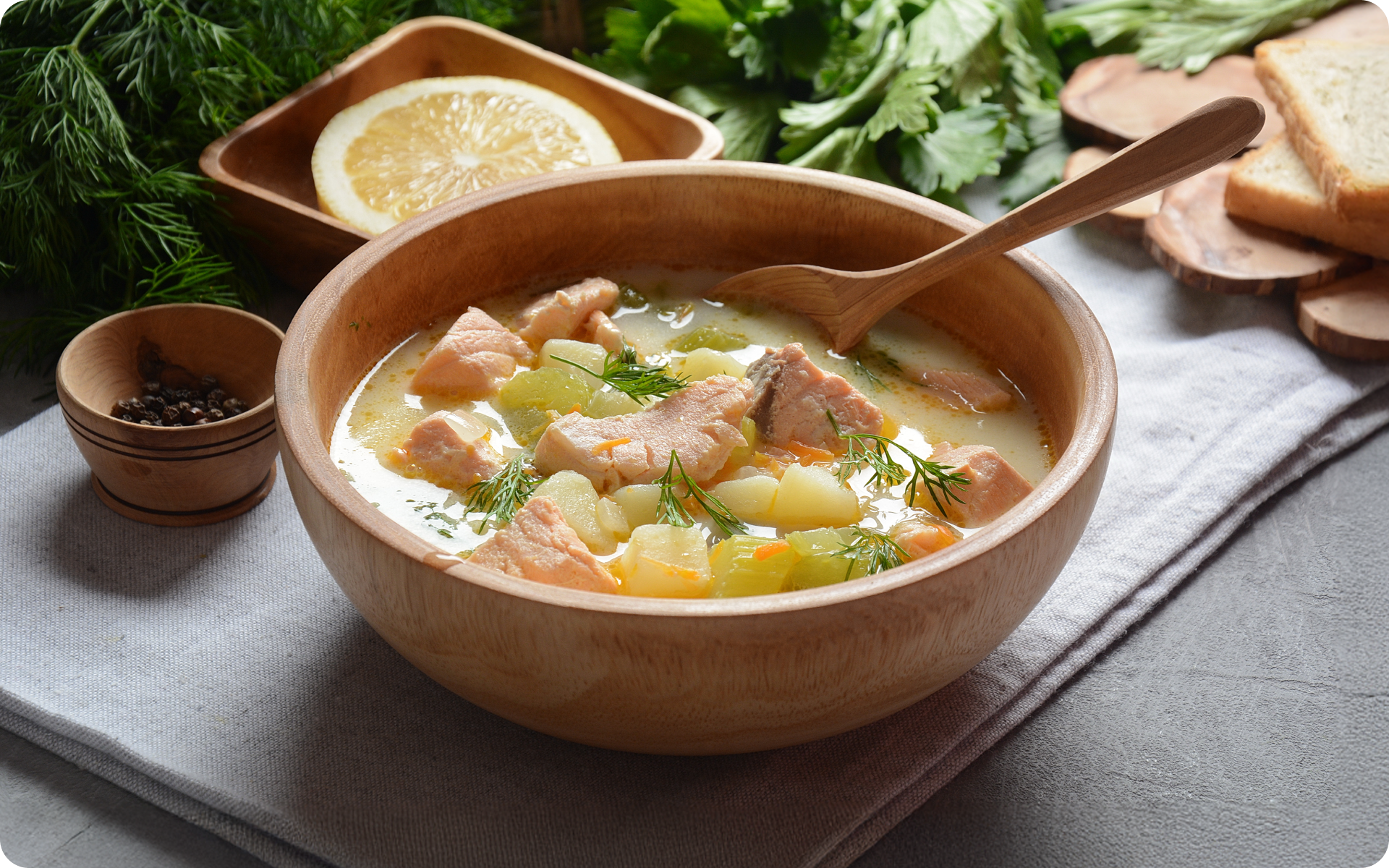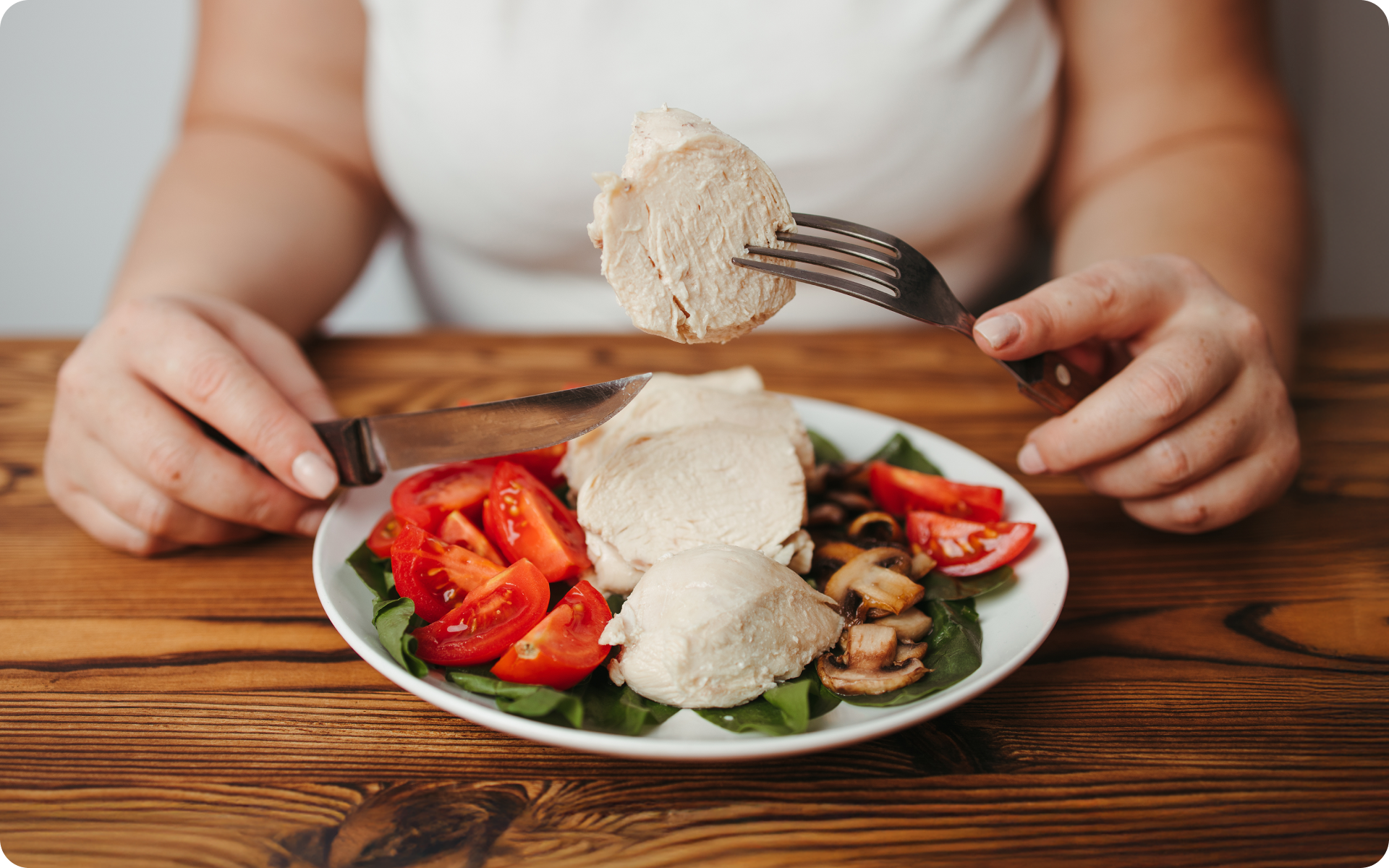What Do We Know About The 1100 Calories A Day Diet?
Dieting and losing weight in general is a numbers game, in which you calculate the exact number of calories you need to both consume and burn. These numbers are often stated in the names of diets, letting people understand what to expect from them. One of those such diets is the 1,100-calories-a-day one, with which you have to eat the stated number of calories on a daily basis, regardless of your daily norm. Consequently, since women’s bodies naturally need less calories to function properly this diet is easier for women to follow.
Get your personalized
meal plan!
Eating 1,100 calories a day is not the most extreme form of dieting, which may make it safer than a number of other meal plans. That being said, it might be not suitable for certain groups of people. So, let’s get into looking at what’s involved in the 1,100-calories-a-day diet to identify its potential risks and the best strategies for enhancing your dieting experience.
What Happens If You Eat 1100 Calories A Day?
First off, a 1,100-calorie diet is classified as a low-calorie meal plan, meaning it involves eating less calories than your body needs. Basically, on a low-calorie diet, the daily calorie intake makes up 1,000-1,500 calories. By eating only 1,100 calories a day, you create a caloric deficit, which is a condition that can ultimately result in weight loss. As a consequence of normal activity, you will be burning more calories than you consume and this is a natural way to shed pounds.
In the state of the caloric deficit, your body is looking for the alternative energy sources to ensure the proper functioning of the body systems. Fat deposits in different areas of the body are the best alternative energy reserves to fuel you up. As your body converts fat into energy, you will be losing weight (3).
However, it is not recommended to jump into the 1,100-calories-a-day diet without preliminary preparation and expert’s consultation. Since each body is unique, the one-size-fits-all approach will not work here. 1,100 calories is less than most people need in a day to stay healthy and get in all the nutrients they require. Low calorie diets in general may be even more risky for those with certain medical conditions or histories. So, if you decide to try this diet, you should first consult your doctor and dietician and undergo a physical examination (10).
Another thing you should take into consideration is whether you really need to lose weight. For example, you can calculate your BMI to see how close you are to your ideal weight. One easy way to measure your body composition is to take a measurement of your waist circumference (10).
Read More: Different Types Of Diets: The Lowdown On The Most Talked-About Weight Loss Strategies
What Is The Normal Daily Calorie Intake?
Depending on their age, BMI, and sex, people require different numbers of calories. According to the Dietary Guidelines for Americans, the calorie intake for women should make up between 1,600-2,400 calories and a bit more for men – 2,000-3,000 calories (1).
On the 1,100-calorie diet, the number of pounds you lose will depend on the number of calories you need to maintain your weight. 1 pound of fat equals 3,500 calories, which is the main criterion you should consider when creating a 1,100-calorie-a-day meal plan (1). For example, if you are aiming at a rate of 2 pounds lost a week, which is the maximum recommended to shed a week (9), you will need to create a weekly 7,000-caloric deficit. On a daily basis this means you will be looking at cutting back on your daily caloric intake by 1,000 calories a day.
BetterMe app will kick you out of the mental funk, shake off your extra weight, rid you off you energy-zapping habits, and help you sculpt the body of your dreams. Intrigued? Hurry up and change your life for the better!
What To Eat For 1100 Calories A Day?
Once you have made up your mind and cleared it with your doctor to try a low-calorie diet, the “what to eat” question becomes especially relevant. As its name suggests, the 1,100-calories-a-day diet consists of eating no more than this number of calories. However what exactly you will be eating is pretty flexible as nothing is said about the food choices for this meal plan. So then, you might ask yourself: should I even restrict myself in what I eat?
The answer is definitely “yes.” Since you are not allowed to exceed 1,100 calories a day, it is crucial for you to eat products that are both nutritious and low in calories. Here’s the list of foods with which you can substitute for those that are neither compatible nor suitable for the meal plan:
- Fruits and veggies. As food sources which are rich in nutrients and fiber, these will help you curb your appetite (10).
- Lean protein foods and low-fat dairy. These include fish, skinless chicken, skimmed milk, etc., all of which are rich in protein that facilitates weight-loss (10).
- Whole grains. Besides being rich in complex carbohydrates, whole grains contain a great number of nutrients, antioxidants, vitamins, and minerals, which are essential for a substantial meal (8, 10)
- Herbs and spices. These add flavor to your food without adding calories. Just beware of spice blends that may be high in sodium, which can contribute to weight gain (4, 7).
What To Do On The 1100-Calories-A-Day Diet?
To create a caloric deficit, eating less than you need is not the only thing that you can be doing. Along with that, you can engage in some other weight loss practices, such as physical activity. Getting active is always a healthy and effective way to burn calories. Vigorous physical activities, including jogging, swimming, skiing, and competitive sports can work miracles for your body. Likewise, you can make use of the high-intensity workouts that will make your fat melt. Usually, after an hour of such workouts, you burn 400-600 or even more calories. If you do regularly practice such high intensity, high calorie-burning workouts, however, eating only 1,100 calories on those days may not be enough to stay healthy.
If you are too busy throughout each day and so hardly have the time and willingness to do high-intensity workouts, you can still find other ways to make your lifestyle more active. Even such a non-demanding activity as brisk walking for 20-30 minutes, can have an invaluable impact on your weight management. Other activities of moderate-intensity include stretching, dancing, and hiking. An hour of any one of these can burn up to 400 calories at a time (6).
In addition, if you are used to commuting by car, you should think about walking the distance instead. Likewise, if you usually use an elevator, try walking up and down the staircase, as this is already considered a moderate-intensity physical activity.
Overall, the easiest and most effective way to create a caloric deficit is to combine physical activity and dieting. In other words, to burn 600 calories a day, you do not necessarily have to do that all through restricting your caloric intake. For example, you can eat 300 calories less than usual and at the same time burn another 300 calories through moderate-intensity exercises.
Read More: Ways To Exercise At Home: Going Full Throttle On Your Body Transformation Plans
1100 Calories A Day For Sedentary Lifestyle
If you do not feel like doing physical exercises and would prefer to stick to a sedentary lifestyle, you are free to do it. However, in this case, you will have to considerably cut the size of your portions, so that at the end of each day you eat no more than 1,100 calories. For this, you will need to choose low-calorie foods (10). Generally speaking, it is possible to follow a 1,100-calories-a-day meal plan without engaging in physical activity.
Is Eating 1100 Calories A Day Safe?
The 1,100-calories-a-day diet is not the easiest one to follow, considering you have to deal with constant hunger. Being forced to abstain from food for lengthy periods, you are very likely to snap and break your diet. This can consequently lead to rapid weight gain shortly after, making it hard for you to keep the lost pounds off.
In addition, the 1,100-calories-a-day diet can be harmful for the following groups of people (5):
- Pregnant and breastfeeding women
- Women who have irregular menstrual cycles because of being underweight
- Individuals who have eating disorders
- Individuals under 18
- People who are already underweight
Is Eating 1100 Calories A Day Healthy?
The 1,100-calories-a-day diet can be unhealthy for your body primarily because you do not get the necessary number of nutrients. Undereating minerals, vitamins, macros, and fiber can result in malnutrition, which negatively affects your body systems. For instance, when following a 1,100-calories-a-day meal plan, you risk losing muscle. Similarly, due to the lack of minerals, calcium in particular, your bones can get fragile, which in the long run might result in osteoporosis and fractures.
Furthermore, when you do not get enough nutrients, your metabolism slows down, and your body enters the survival mode. By doing this, your body stores energy to fulfil the essential functions. Gallstones are another problem you might face when eating around 1,100 calories a day. These cause acute abdominal pain, which can be eliminated only through surgery (2).
Another area that might suffer as a result of the 1,100-calories-a-day diet is your nervous system and brainwork. As you eat fewer calories, you receive insufficient fuel (glucose) for your body to run on. Consequently, if you stick to the 1,100-calories-a-day meal plan, you should not get surprised when you feel that your brain is not performing to its full potential. Plus, you might feel constantly exhausted (2).
Key Takeaways
Being classified as low-calorie, the 1,100-calories-a-day diet involves under eating and restricting yourself in the choice of food. On this diet, you are creating the caloric deficit necessary for weight loss. Of course this will depend on your weight and current caloric intake. In any case, you will have to calculate the number of calories you eat on the daily to avoid exceeding the required one.
Although it is not necessary to restrict yourself in food choice on the 1,100-calories-a-day diet, it is recommended to do so for better meal planning. The products you should eat include fruits and vegetables, whole grains, non-fat dairy, lean protein, and herbs and spices.
To facilitate the effect of the 1,100-calories-a-day diet, you can try hiking, dancing, swimming, and other physical activities. Nevertheless, if you prefer a sedentary lifestyle, you can avoid exercising and just focus on dieting.
As for the safety of the diet, it depends on your lifestyle, health, and physical characteristics. You should not reduce your caloric intake to 1,100 calories a day if you are a(n):
- Breastfeeding or pregnant woman
- Minor
- Woman with irregular menstrual cycles
- Underweight person
- A person with eating disorders
In addition, you should consult a doctor before starting the diet to prevent possible health problems, such as gallstones, osteoporosis, etc. Plus, you need to remember that when eating less than is needed, you risk having slow metabolism and brainwork. Overall, it is strongly recommended that you undergo a medical examination to avoid possible problems.
DISCLAIMER:
This article is intended for general informational purposes only and does not address individual circumstances. It is not a substitute for professional advice or help and should not be relied on to make decisions of any kind. A licensed physician should be consulted for diagnosis and treatment of any medical conditions. Any action you take upon the information presented in this article is strictly at your own risk and responsibility.
DISCLAIMER:
This article is intended for general informational purposes only and does not serve to address individual circumstances. It is not a substitute for professional advice or help and should not be relied on for making any kind of decision-making. Any action taken as a direct or indirect result of the information in this article is entirely at your own risk and is your sole responsibility.
BetterMe, its content staff, and its medical advisors accept no responsibility for inaccuracies, errors, misstatements, inconsistencies, or omissions and specifically disclaim any liability, loss or risk, personal, professional or otherwise, which may be incurred as a consequence, directly or indirectly, of the use and/or application of any content.
You should always seek the advice of your physician or other qualified health provider with any questions you may have regarding a medical condition or your specific situation. Never disregard professional medical advice or delay seeking it because of BetterMe content. If you suspect or think you may have a medical emergency, call your doctor.
SOURCES:
- 1100 Calorie Diet (2019, livestrong.com)
- 4 Ways Low-Calorie Diets Can Sabotage Your Health (2020, eatright.org)
- Calorie Deficit for Losing Weight (2020, verywellfit.com)
- Effects of weight loss and sodium reduction intervention on blood pressure and hypertension incidence in overweight people with high-normal blood pressure. The Trials of Hypertension Prevention, phase II. The Trials of Hypertension Prevention Collaborative Research Group (1997, pubmed.ncbi.nlm.nih.gov)
- How to eat 1,200 calories a day (2019, medicalnewstoday.com)
- Physical Activity for a Healthy Weight (2015, cdc.gov)
- The Connection Between Salt and Weight (2017, webmd.com)
- Tips for Reaping the Benefits of Whole Grains (n.d., webmd.com)
- Weight loss: 6 strategies for success (2019, mayoclinic.org)
- What Is a Low-Calorie Diet? (2020, verywellfit.com)















